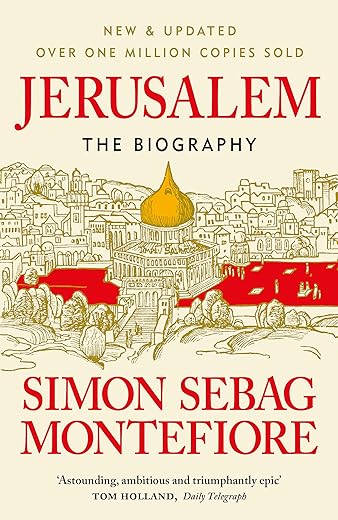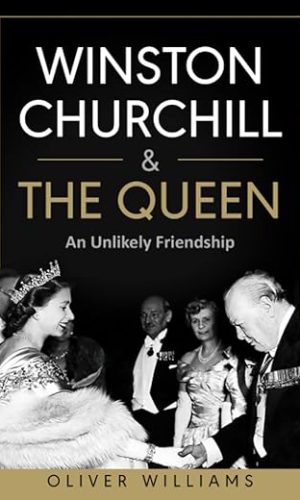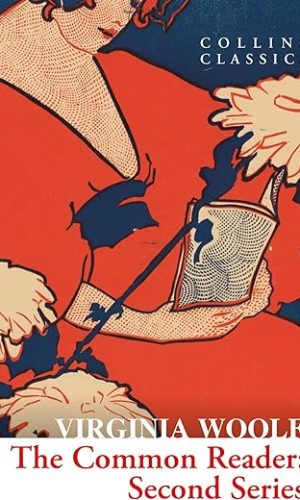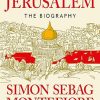Jerusalem: The Biography
£12.90£14.20 (-9%)
A new, updated, revised edition of JERUSALEM: THE BIOGRAPHY, the wider history of the Middle East through the lens of the Holy City, from King David to today.
The story of Jerusalem is the story of the world.
Jerusalem is the universal city, the capital of two peoples, the shrine of three faiths; it is the site of Judgement Day and the battlefield of today’s clash of civilisations. How did this small, remote town become the Holy City, the ‘centre of the world’ and now the key to peace in the Middle East? Drawing on new archives and a lifetime’s study, Montefiore reveals this ever-changing city through the wars, love affairs and revelations of the kings, empresses, prophets, poets, saints, conquerors and whores who created, destroyed, chronicled and believed in Jerusalem.
A classic of modern literature, this is not only the epic story of 3,000 years of faith, slaughter, fanaticism and co-existence, but also a freshly-updated history of the entire Middle East, from King David to the twenty-first century, from the birth of Judaism, Christianity and Islam to the Israel-Palestine conflict and the wars of today. This is how Jerusalem became Jerusalem – the only city that exists twice – in heaven and on earth.
Read more
Additional information
| Publisher | 1st edition (17 Sept. 2020), W&N |
|---|---|
| Language | English |
| Paperback | 784 pages |
| ISBN-10 | 1474614396 |
| ISBN-13 | 978-1474614399 |
| Dimensions | 12.8 x 5 x 19.6 cm |










by Misspuddleduck
Very well written, useful for research as well as great information
by Milo di Thernan
Alternative title #2: This is a book for intermediate historians and brave beginners.
Alternative title #3: Everyone’s here, so enjoy access to the back catalogue before making your mind up about today.
Housekeeping: There’s a typo (a surplus letter ‘a’) on line 3, page 344 of the 1st hardback edition. On page 459, “The streets “teemed crowded.” On page 488, missing ‘of’ “…something out (of) Eliot’s Cocktail Party…” On page 515, a missing ‘of’ in “…the practicality (of) a Palestinian state…”
Forgive me for expressing them up front, but you might as well know where my prejudices lie before you listen to my opinion. I read history to give me a richer sense of today. Rationally? Is today’s news on Syria, Egypt or Gaza different enough from yesterday’s to mean that tomorrow will see substantial change? Romantically? Just touch the past and dwell there a while by, for example, touching the blue & gold gates on Piccadilly inserted into Green Park’s iron fence opposite Half Moon Street, and sense the presence of Georgiana and 18th century Whigs, from whose Devonshire House the two gates were salvaged. (Look through said gate towards Buckingham Palace and spy the twin gate. Were they connected by a thoroughfare as the trees suggest…down which who travelled…when and in what attire…for what event?) So, a serious interest in current events and a romantic sense of wonder draw me to reading history. Both head and heart agree that this book was a fabulous read.
I thoroughly enjoyed this kind of anecdote: “Weizmann was Zionism’s grand seigneur, dressed in Savile Row suits, more at home in the salons of Mayfair than on the sunbeaten farms of Galilee and now well-off from founder shares in Marks & Spencer, donated by his friends, the Sieff family (p. 446).” Jemima Khan’s grand-dad founded the King David Hotel. Forbears of Yitzhak Rabin and Edward Said pop up and even Franz von Papen makes an appearance. But I could keep up, and if my excitement at these references is losing your enthusiasm, then it might be the wrong book for you. It refers to so much and so many that you can easily get left behind by the sheer weight of knowledge with which you have to keep up to enjoy the next chapter. I think the three star reviewer, Steve, is spot on in accusing the author of “trying to put a gallon instead of a quart into a pint pot”, but I applaud the gallon and don’t really care about the pint pot. Others might, though, and this is probably the major source of controversy with this book. It lacks the intimate characterisation of a biography, but provides a wonderful historical storyboard, peppered with entertaining gossip. Don’t expect to cherish every page – it is a storyboard and a fine foundation for a general History of the World – a much more enjoyable read than, say, H.A.L. Fisher or J.M. Roberts.
The more history you read, the easier it gets; like a soap opera, you become familiar with the characters, their habitats and their neighbours. Intermediates will enjoy it most, but brave beginners should have a go too – there’s always Wikipedia to fill in the gaps.
“Here, more than anywhere else on earth, we crave, we hope and we search for any drop of the elixir of tolerance, sharing and generosity to act as the antidote to the arsenic of prejudice, exclusivity and possessiveness.” (p.510)
by Laymin
Very glad I read this. At times the author goes into significant detail. At other points he seemed to skate over periods and events. I also note he took a sceptical view of the historicity of the Bible. For example I noted he covered 3 kings after Josiah of Judah died. The Bible lists 4! However the end product is a fascinating history even though it leaves us doubting that there will ever be peaceful co existence between Jews and “Arabs/Palestinians”. The claims and objectives of the two sides seem totally incompatible.
by YS
This book had been on my reading list for quite a while, so when I finally got around to it I was quite enthusiastic about getting stuck in. The fabulously-named Simon Sebag-Montifiore has has had his finger in a few pies recently – history books, novels and a couple of TV series to boot, and this was the first of his books I have tackled.
The book is divided into several sections, each one focusing on the different empires, kingdoms and dynasties that have ruled Jerusalem over the millennia. Sebag-Montifiore (S-M)’s writing style is easy to read and enjoyable, and he makes it as easy to follow as possible. The introduction in particular, is a real blood-thirsty snapshot of a key moment in the city’s history.
Unfortunately the rest of the book doesn’t live up to the introduction. The problem is, S-M has taken a massive subject – (the book is subtitled ‘a new history of the Middle East) and tries to pack everything into 600 pages (the type is also quite big – compared to similar books). As a consequence the book tears though each era, becoming little more than a series of names and dates at some points. This was especially apparent at the beginning when described the Old-Testament era. The problem is further exacerbated there by the fact that S-M admits the only source for this period is the Old Testament.
The problem runs throughout the book. For reasons of space S-M is not able to go into any particular background detail, so many characters are introduced with little background or historical context. I enjoyed the section on the Romans as I already knew a lot of the background information prior to reading this book, so could place events in their proper historical context. I also enjoyed the section on the crusades as S-M seemed to slow down slightly there and take his time to explain the background and significance of what happened (I wonder if this is the author’s particular area of interest?). Much of the early Islamic, Mamluk and Ottoman period were very rushed, and characters were named once in the text and then referred to several pages later again – I found myself skipping back quite a lot to remember who they were. All this makes for quite a dissatisfying read.
However, the final sections of the book, from the beginning of the section on Zionism, right through to the end are much better. S-M slows down the narrative here, which is probably necessary to describe the political upheavals throughout the late 19th/early 20th century. I enjoyed this part of the book very much, and learnt much about the current situation on the Middle-East from it. He manages to maintain, as he states in the introduction, a fair and impartial voice when looking at the actions of both sides, and both sides come in for their fare share of criticism. S-M could have written a book of similar length just on this period, and it would have been much more successful.
So overall, a very mixed bag. If you have some prior knowledge of the Middle-East and can put the events into context, then you will no doubt enjoy this book immensely. If you are a new history reader, or not familiar with a lot of the empires and kingdoms concerned, you will struggle with a bewildering list of names, dates, places and battles. Maybe worth borrowing from the library for the excellent section on Zionism and the creation of Israel. Sebag-Montifiore simply took on too big a project for a book of this size – it would need to be three times the length to provide adequate background and detailed analysis of the various periods.